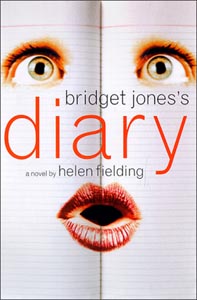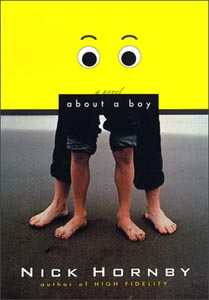Hip, Young, Different
About a Boy
By Michelle Goldberg
HELEN FIELDING and Nick Hornby are, for the moment, two of Britain's reigning hip young literary stars, and the fictional worlds of their new novels are so similar that their characters could easily waltz between them.
Fielding's Bridget Jones's Diary and Hornby's About a Boy both deal with single, trendy, pop-culture-obsessed Londoners in their 30s. Indeed, each protagonist is the summation of the others' fears about the opposite sex. Hornby's Will Lightman is precisely the sort of noncommittal cad that Bridget Jones and her friends bemoan, and Jones is the kind of matrimony-craving harpy that terrifies Will. Fielding refers to Hornby's work in Bridget Jones, and a recommendation from Hornby graces its back cover.
Despite all this coziness and the similarities of character and milieu, Fielding's book is cloying and, considering all the hype, rather disappointing, while Hornby's is refreshing, insightful and addictive. The difference between them illustrates the distinction between writing shallow characters and writing shallowly.
I'd been eagerly waiting for Bridget Jones's Diary ever since I first heard about it. The buzz was that Bridget Jones, a bestseller in England, promised a peek into the tumultuous soul of a crazed city girl, and I was hungry for that delicious spark of empathy that such self-absorbed comedy can offer. After all, one of the greatest pleasures of reading is the joy of seeing your most shameful, banal or peculiar thoughts laid bare, the exhilarating feeling that you're not alone. Says the press release, "Readers here and around the world are already helpless with laughter and shouting, 'BRIDGET JONES IS ME!' You will, too."
Well, the PR person can speak for herself, because Bridget Jones isn't me or any woman that I know. She's an insipid caricature of female neediness, a hard-drinking Ally McBeal. Sure, many of us can relate to the way Bridget obsesses over eating too much chocolate and veers wildly between confidence and paralyzed self-loathing, but there's nothing more to her than her neuroses.
She reads Men Are From Mars, Women Are From Venus, takes fashion magazines seriously and lets married people humiliate her about being single. Fielding's jokes rarely aim higher than a Cathy cartoon--witness the long, unfunny scene in which Bridget struggles to program her VCR or the rant about communal fitting rooms in department stores.
Granted, other passages are sharper, especially when we're privy to Bridget's more unspeakable thoughts. When one of her best friends goes missing, for instance, Bridget starts fantasizing about how glamorously tragic she'll be at the funeral. Sometimes, she imagines that her boyfriend is cheating on her just so she can think up "dignified but cutting remarks to make him sorry."
More often, however, Fielding just gives us endless chronicles of Bridget's frightfully mundane days. Each bit starts out with a list of how many calories Bridget consumed, how many cigarettes she smoked and how much alcohol she drank. It's cute at first but terribly grating after two hundred or so pages.
Like a journal, the book is composed of short sections, and while Fielding replicates the affectless, off-the-cuff feel of a diary, the casual, abbreviated style ("v." for very, lots of "aarghs," "ughs" and "humphs") quickly becomes tedious. Here's a typical passage: "2 p.m. Oh God, why am I so unattractive? Cannot believe I convinced myself I was keeping the entire weekend free to work when in fact I was on permanent date-with-Daniel standby. Hideous, wasted two days glaring psychopathically at the phone, and eating things. Why hasn't he rung? Why? What's wrong with me?"
But About a Boy is a sweet, wry, hysterically funny book. Will's inner life resembles all kinds of male stereotypes, but Hornby's writing is so penetrating and ultimately compassionate that we can relate to Will far more easily than we can to Bridget. There's a genuine dramatic arc in About a Boy in which salvation from urban anomie means much more than just landing an economically viable mate.
Will is an unemployed man who lives off the copious royalties from a famous Christmas jingle written by his father. His interests rarely extend further than afternoon television, pop music, drugs and pubs. As the book begins, he thinks he's discovered the secret of bedding beautiful women despite his uninteresting life--single moms: "He decided that children were what was happening here: that children served as a symbolic blemish, like a birthmark or obesity, which gave him a chance where previously there would have been none. Maybe children democratized beautiful single women."
But after one happy experience, he has trouble meeting other lonely mothers, and so he invents a child and joins a support group for single parents. From there, through a bizarre and darkly hilarious series of events, he meets Marcus, the geeky 12-year-old son of a suicidal hippie mother.
About a Boy is told half from Marcus' perspective and half from Will's as Will becomes a reluctant surrogate father to the boy. The book is a wish-fulfillment fantasy for former child outcasts. Will finds that his vacuous hipster lifestyle has taught him all the rules of grade-school popularity, and he takes Marcus under his wing.
He even fends off high school kids who bully his odd young protégé. "Marcus needed help to be a kid, not an adult," Hornby writes. "And, unhappily for Will, that was exactly the kind of assistance he was qualified to provide. He wasn't able to tell Marcus how to grow up, or how to cope with a suicidal mother, or anything like that, but he could certainly tell him that Kurt Cobain didn't play for Manchester United."
In turn, Marcus lures Will out of his stylish isolation. Toward the end Hornby writes, "[Will] felt as if he were a chick whose egg had been cracked open, and he was outside in the world shivering and unsteady on his feet, without so much as a Paul Smith suit or a pair of Ray-Bans to protect him."
Hornby cleverly and sensitively works Cobain's suicide into About a Boy's narrative. Cobain's death resonates with Marcus' fear that his own mother will do herself in, and it sparks all kinds of catastrophe and catharsis. In Bridget Jones, conversely, the numerous pop-culture references are utterly incidental. We learn what television programs Jones likes (Blind Date and BBC's version of Pride and Prejudice) and which self-help books her friends are reading, all of which just serves to make Bridget more of a blank, an empty, demographers version of a 30-something woman.
Hornby, though, uses music to draw out his character's quirks. "He loved Nirvana, but at his age they were kind of a guilty pleasure," he writes. "All that rage and pain and self-hatred! Will got a bit ... fed up sometimes, but he couldn't pretend it was anything stronger than that. So now he used loud angry rock music as a replacement for real feelings, rather than as an expression of them, and he didn't even mind very much. What good were real feelings anyway?"
How ironic, then, that there's more real feeling in Will's laconic apathy than in a dozen of Bridget's temper tantrums and nervous breakdowns. It's sad that a book purporting to speak for an entire gender offers such a pathetic version of female life. Women looking for a story full of sharply honed truths and comforting, screwed-up humanity would be far better off spending Sunday afternoon with Hornby's obnoxious but wonderfully real Will Lightman than indulging in Helen Fielding's trite pity party.
[ San Jose | Metroactive Central | Archives ]
Copyright © Metro Publishing Inc. Maintained by Boulevards New Media.
![]()
 Trend in the River: British novelists Helen Fielding and Nick Hornby work the same territory with varying results.
Trend in the River: British novelists Helen Fielding and Nick Hornby work the same territory with varying results.
Bridget Jones's Diary
By Helen Fielding
Viking; 320 pages; $22.95 cloth
By Nick Hornby
Putnam; 288 pages; $22.95 cloth
 HORNBY'S WILL LIGHTMAN is, on the surface, a much less sympathetic character than Bridget Jones. She's the victimized woman, desperate to get married but constantly being stiffed by commitment-phobic men, while Will lives in horror of emotion and spends days devising elaborate schemes to sleep with women and then discard them before an attachment can form.
HORNBY'S WILL LIGHTMAN is, on the surface, a much less sympathetic character than Bridget Jones. She's the victimized woman, desperate to get married but constantly being stiffed by commitment-phobic men, while Will lives in horror of emotion and spends days devising elaborate schemes to sleep with women and then discard them before an attachment can form.
From the June 25-July 1, 1998 issue of Metro.
![[Metroactive Books]](/books/gifs/books468.gif)